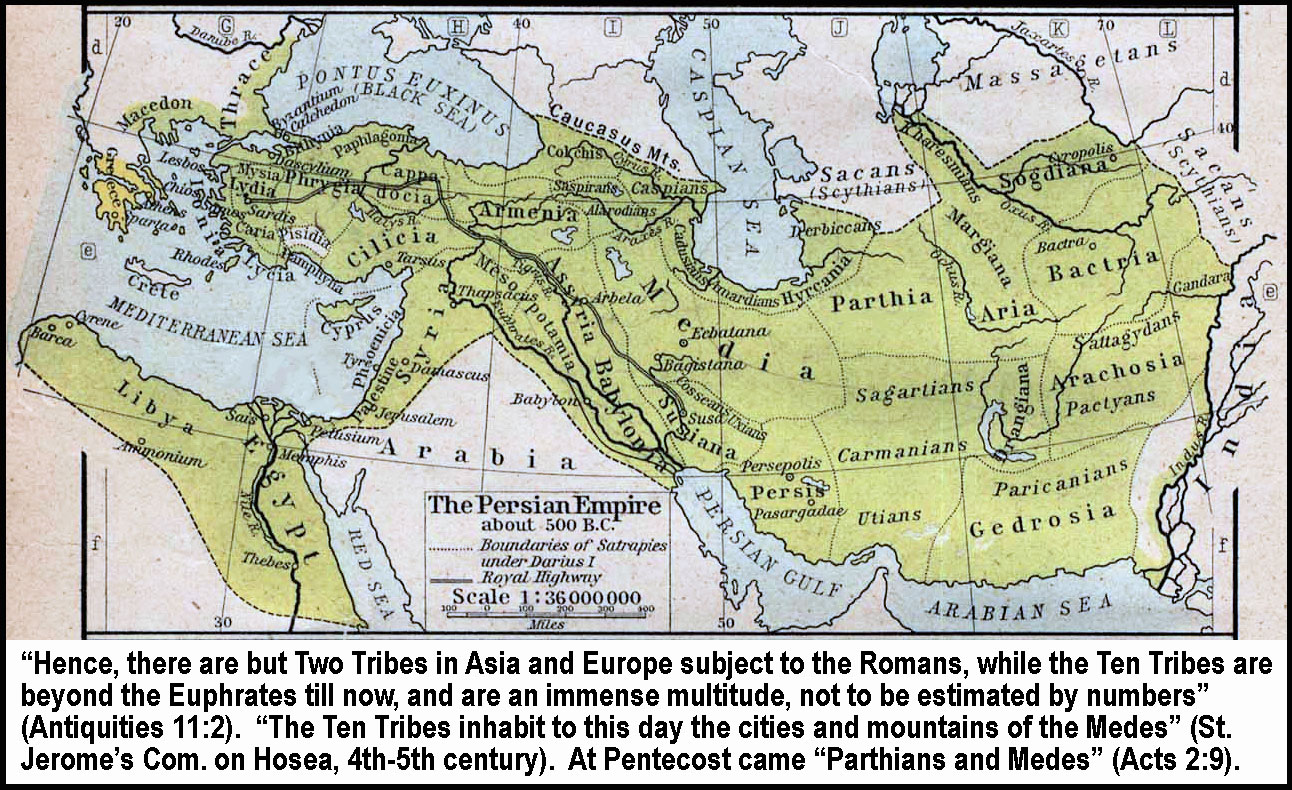
Were The Parthians ISRAELITIES?
The clans of Ephraim were BACHRITES, ERANITES and TAHANITES which became the provinces of BACTRIA, ARIANA (Iran), and DAAE or DAHAE ("t" and "d" are linguistically similar consonants) (Num. 26:35). Eran may have settled in Eran and Erandol India (14:625c; 14:382 F9). Strabo says BACTRIANA was once occupied by the SACAE (11:8:4). The EPHTHALITES or White Huns (Encyc. Brit. 9:679) were another tribe taking their name from Naphthali. Strabo says Alexander the Great noted a region called ASAACANUS (11:3:3). The chief city of the Parthian province of Media Atropatene was GAZA. In the Parthian province of HYRCANIA was the city of SAMARIANE.
The Euphrates River was Parthia's western border dividing it from the Roman Empire (p.83, Langer's World History). When Josephus said the TEN TRIBES are "beyond Euphrates" it was tantamount to saying "in PARTHIA." In 65 A.D. King Agrippa tried to persuade the Jews not to rebel against Rome by saying, "Those of your own nation that dwell in ADIABENE" won't come to your assistance in a war (Wars 2:16,4). ADIABENE is the Greek name for MEDIA and PARTHIA. PARTHIANS are included among the faithful in Acts 2:9. The "Medes, and Elamites" and Mesopotamians are also included. These are the places the LOST TEN TRIBES were taken as captives and Peter calls them "Ye men of ISRAEL" (Acts 2:22). A delegation of "Magi" from PARTHIA (Strabo 11:9:3) came to worship Jesus with royal gifts. "When Herod, the king, had heard these things, he was TROUBLED, and ALL JERUSALEM with him" (Matt.2:3). Jesus was of the ruling family of Phares (Matt.1:3) and therefore was a candidate for the thrones of both PARTHIA and SCYTHIA. Rulers of both PARTHIA and SCYTHIA had names incorporating the word PHARES or PRS (Pharesmenes; Gondophares; Phraates, Phraortes, Phraataces) indicating the ARSACIDS (Parthia's ruling family) were of David's line (1 Chr.3:17-24). PARTHIA'S first king and the city of his coronation were named after Isaac (Gen.21:12). The king was ARSACES and the city was ASAAK (Encyc. Brit. 11th, 20:870). An east PARTHIAN province was called SACASTANA (Saxon). The first capital city of PARTHIA was named DARA after the grandson of Judah "Dara" (1 Chr.2:6). PARTHIAN rulers throughout all its history were members of this one family -- the ARSACIDS. Yes, "David shall never want (lack) a man to sit upon the throne of the house of Israel" (Jer. 33:17). The scepter was given to Judah (Gen.49:10). When Satan offered Christ the thrones of the world if he would worship him (Matt.4:8-10), this was a very real possibility. The apostles asked in Acts 1:6, "Wilt thou at this time restore the kingdom to Israel?" Also when Herod received the"Magi" he had to use caution. PARTHIA had ruled Jerusalem and Palestine from 40 to 38 B.C. (Rawlinson's Ancient History, p.485) and there was a quasi-peace in existence with rival PARTHIA. When the Magi asked, "Where is he that is born king of the Jews?" Herod was insulted because he thought he was king of the Jews. But Rome let Jesus alone to speak and travel as he wished even though he sometimes stirred up a commotion. Pilate even asked "Are you a king?" and allowed him to defend himself, finally giving the responsibility to Herod to try and avoid sentencing an innocent relative of PARTHIA'S emperor. The apostle John in the book of Revelation referred to the returning Jesus Christ as "the KING of KINGS" (Rev.19:16) which was a traditional PARTHIAN title for monarchs at the time John wrote (Brit. 21:215) indicating Jesus would inherit the throne of David in PARTHIA when he returns. Changing "P" to "B" we get BARTHIAN or BRITAIN.
Josephus originally wrote his Wars of the Jews in HEBREW for the PARTHIANS. He said, "I have proposed ... for the sake of such as live under the government of the Romans, to translate those books in the Greek tongue, which I formerly composed in the language of our country (HEBREW), and sent to the upper barbarians (PARTHIANS) beyond Euphrates" (Preface 1-2). Rawlinson says, "Josephus ... regarded the PARTHIANS as familiar with the HEBREW ... and wrote his History of the Jewish War in his own native tongue, before he put out his Greek version, for the benefit especially of the PARTHIANS among whom he declares he had many readers" (Sixth Oriental Monarchy, p.424). Interestingly, "the Parthians look upon locusts as a choice food, and eat the grasshopper also." (Pliny Hist. 11:35)
Grammarians observe certain letters which are called labial because pronounced with the lips: they are b, f, m, p, v; of these the b, f, p, v, put at the beginning of words, are pronounced almost with the same motion of the lips, and are thus often interchanged.